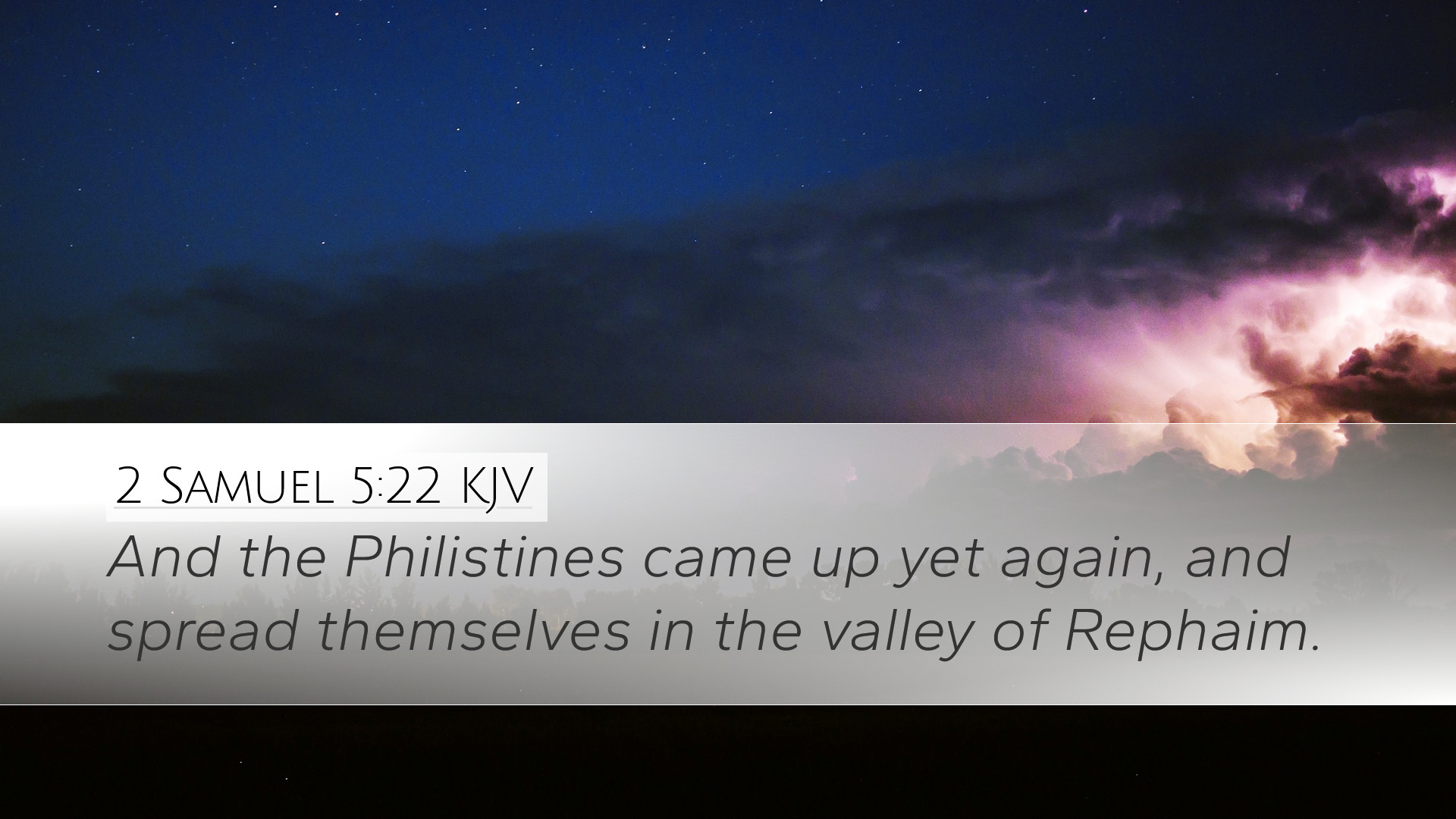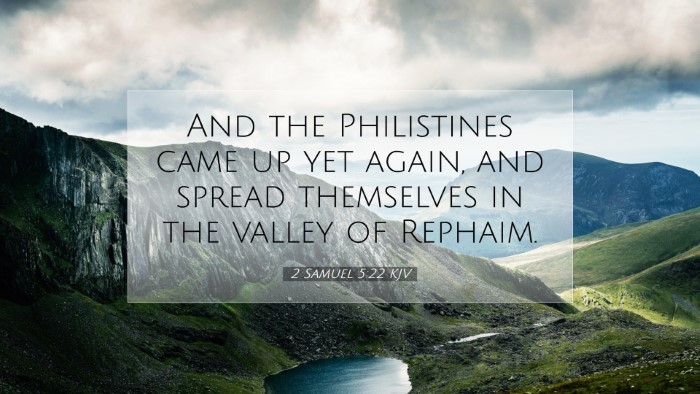Commentary on 2 Samuel 5:22
Verse: "And the Philistines came up yet again, and spread themselves in the valley of Rephaim."
Introduction
This verse marks a significant moment in the ongoing conflict between Israel and the Philistines. After David's initial victory over the Philistines, they return with renewed aggression. Understanding this scripture requires careful consideration of the historical, theological, and spiritual implications inherent in the text.
Historical Context
The verse narrates the Philistines' persistent hostility towards Israel even after their previous defeats. The Valley of Rephaim was a strategic location near Jerusalem, representing a critical point of warfare.
- Philistine Aggression: This incident sheds light on the ongoing enmity between these two nations, a theme recurring throughout the historical books of the Old Testament.
- The Valley of Rephaim: It is essential to understand the significance of this valley as a battleground. It was not just a geographical location; it was a point of conflict where God demonstrated His power and sovereignty.
Theological Insights
David's Leadership: The return of the Philistines serves to underscore David's role as a leader. His success is not merely due to military prowess but is deeply rooted in his relationship with God.
- Divine Assistance: David's encounters with God in these crises emphasize the need for divine support. Reliance on God in times of trouble is a powerful lesson derived from this narrative.
- The Nature of Warfare: This passage also symbolizes the spiritual warfare every believer faces. The Philistines represent the persistent struggles against sin and opposition that Christians encounter in their spiritual journey.
Commentary from Matthew Henry
Matthew Henry emphasizes the recurring nature of the Philistine threat, which mirrors the persistent trials faced by believers. He observes that difficulties often come after victories, suggesting that one should always remain vigilant against adversaries. Henry notes:
"How careful ought we to be after a victory! The devil is ever ready to make a second attempt when he finds us off our guard."
This reflection serves as a poignant reminder of the Christian life, where past victories can lead to complacency if vigilance is not maintained.
Commentary from Albert Barnes
Albert Barnes provides particular attention to the tactical and military aspects of this conflict. He asserts that the Philistines' regrouping should prompt reflection on human nature's tendency to return to former ways after a defeat. Barnes states:
"It is a common thing for enemies to renew the battle after a defeat; they may be counted upon to form again and come once more to the attack."
This insight stresses the importance of continual preparedness and reliance on God’s power in confronting life's ongoing challenges.
Commentary from Adam Clarke
Adam Clarke reflects on the spiritual implications of this verse, suggesting that the coming of the Philistines can be viewed as a metaphor for spiritual adversities in the life of every believer. Clarke writes:
"Even the most established in grace must expect that their adversaries will make fresh attempts against them."
This acknowledgment is crucial, as it encourages believers to remain steadfast in faith, gathering strength not from ourselves but through divine support.
Application for Today
2 Samuel 5:22 serves as both a warning and an encouragement. It teaches persistence in the face of adversity and the importance of preparedness and dependence on God. For pastors, students, theologians, and Bible scholars, the verse calls for:
- Vigilance: Constant alertness in spiritual warfare situations where the enemy may strike unexpectedly.
- Prayer and Supplication: Seeking divine guidance and strength, as modeled by David, who consistently turned to God in times of distress.
- Community Support: Encouraging one another within the body of Christ, reinforcing the idea that no one faces spiritual battles alone.
- Teaching Resilience: Equipping others to face their challenges with the knowledge that victory often requires a persistent and faithful approach.
Conclusion
In conclusion, 2 Samuel 5:22 provides profound insights into the nature of conflict, both human and spiritual. The scriptures remind us that after significant victories, we must remain aware of the continuous struggles we may face. Through the insights of various commentators, we understand the need for faith, vigilance, and divine reliance in the face of life's ongoing challenges.


